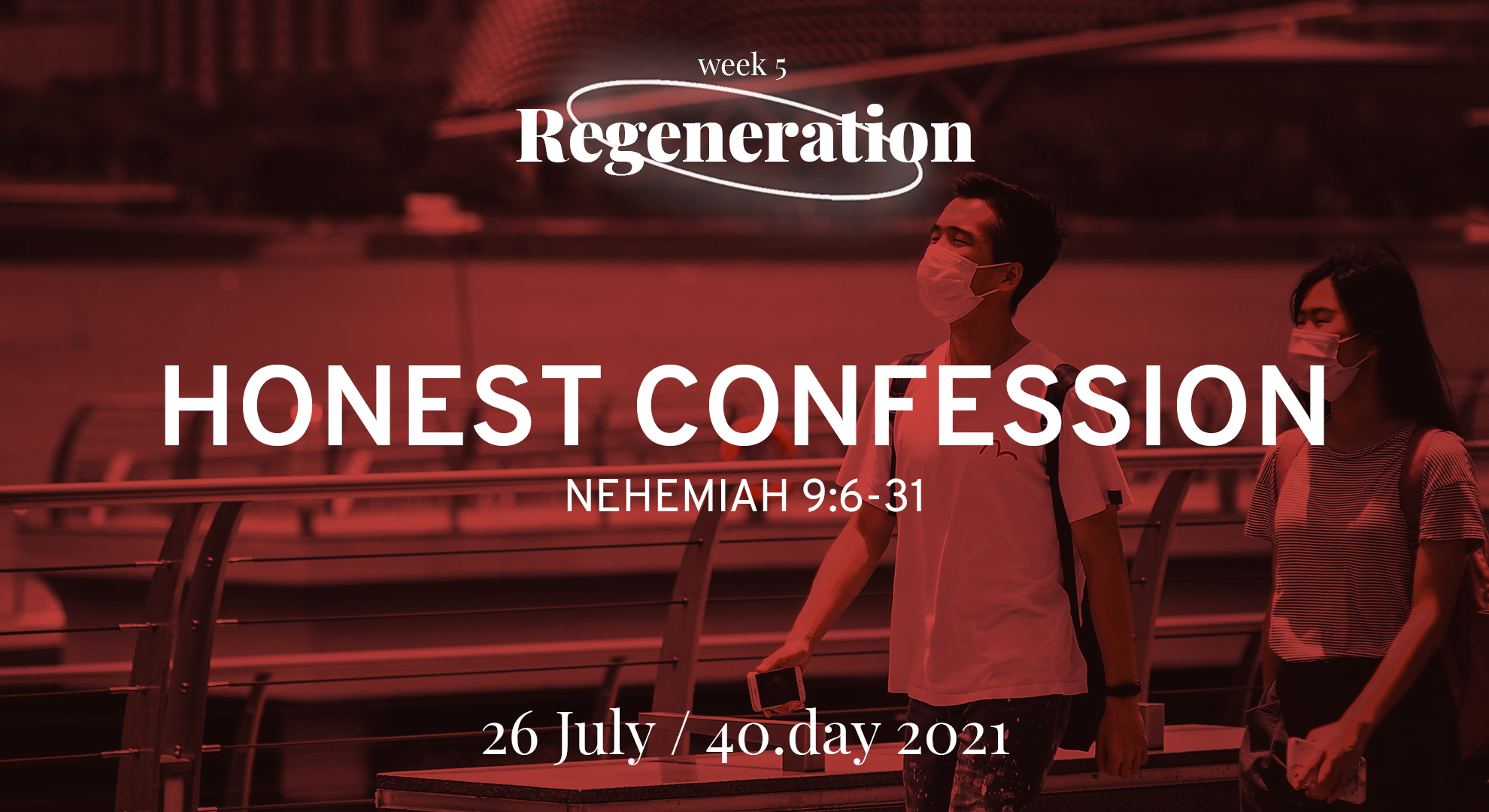Day 26: Honest confession
A LoveSingapore 40.Day prayer and fast devotional, following 2021's theme of From the Ground Up: A Prayer Journey Through the Book of Nehemiah.
LoveSingapore // July 26, 2021, 12:00 am

Bible reading for 40.DAY 2021 | Nehemiah 9:6–31
Nehemiah 9 is neither a wish list nor a sin list. It’s a biblical model of communal confession and corporate intercession.
Churches and believers should put this into practice from generation to generation. The prayer has six parts:
All prayer should begin by exalting God.
One, they confess the sovereignty and providence of God the Creator (Nehemiah 9:6). All prayer should begin by exalting God. Jesus modelled this in the Lord’s Prayer. Our Father who art in heaven, hallowed be Thy name. Prayer is a way of ‘hallowing’ or ‘sanctifying’ God’s great name on earth as it is in heaven.
Two, they acknowledge God’s mighty acts of salvation across history. From the call of Abraham to the Exodus. From the guiding pillars to the giving of the Law. From provision in the desert to prosperity in the Land (Nehemiah 9:7-25).
Thus before breathing a word about their needs, they acknowledge God’s past faithfulness and magnanimity.
Three, they confess their sins and the sins of their ancestors (Nehemiah 9:16-29). God doesn’t punish us for the sins of our forebears (Ezekiel 18). Then why confess them? Because evil has an unearthly power and propensity to reproduce itself in succeeding generations.
Confession with repentance is the circuit breaker.
Children tend to repeat the sins of their fathers even if they don’t know about them. Confession with repentance is the circuit breaker.
Four, they acknowledge God’s righteous judgment (Nehemiah 9:27-34). Every sin affects, not just the sinner, but countless others too.
Adam’s disobedience affected the whole human race. Achan’s sin brought humiliation and defeat on all Israel (Joshua 7). David’s affair with Bathsheba produced ripple effects leading up to a civil war (2 Samuel 11-18).
Every sin, private or public, has communal and generational ramifications. We are all connected.
Every sin, private or public, has communal and generational ramifications.
Five, they take full responsibility for the sins of their ancestors as well as their own (Nehemiah 9:32-37). It’s easy to confess the sins of others, especially the departed. But to stop there defeats the purpose.
We are all in this together. We have acted wickedly. We are slaves … because of our sins (Nehemiah 9:33, 36-37).
Six, they acknowledge God’s mercy, forbearance, and forgiveness (Nehemiah 9:19, 27-31). Biblical confession deals ruthlessly with sin. But there is also a clear expression of hope in the character of God who is always gracious and merciful and ready to forgive (Nehemiah 9:17, 31).
Wall of duty
1. Remember God’s sovereignty. Acknowledge His great faithfulness and magnanimity towards your biological and spiritual family, past and present. Acknowledge His mighty acts of salvation and mercy, His forbearance and forgiveness.
In identificational repentance, own up to recurring patterns of sin, personal or communal, private or public. Break the circuit! Declare: This family will not let sin control the way we live. We will not give in to our sinful desires. Instead, we will give ourselves completely to God and do what is right for His glory (Romans 6:12-13).
God, through Christ, includes every tribe and tongue in His salvation plan.
2. Remember God’s righteous judgment. Recent incidents have spotlighted the issue of racism in our city. Findings from the 2020 wave of the World Values Survey showed that more Singaporeans perceived the presence of racist behaviour in the community compared to the 2012 wave (Dr Mathew Matthews).
Be honest. There is a degree of racial prejudice in each of us. Examine yourself in the fear of the Lord. Confess. Repent:
- Have I come to grips with the gravity of racism? It not only breaches the law of Singapore, it also violates the Law of Love. It’s an affront to God who created all humans in His image and bestowed intrinsic worth on each and every one. Racism mocks God who, through Christ, includes every tribe and tongue in His offer of salvation to fallen humanity. There is no race discrimination (Romans 3:22-23). Heaven is multi-racial (Revelation 7:9-10).
- Have I in thought, word, or deed despised, excluded, or mistreated others because of their race?
- Have I denied others equal opportunity on the basis of race?
- Have I ever seen someone being victimised by racism and failed to speak up or take action?
- Have I ever stood up for a victim of racism and paid the price for it? Would I do it again regardless of consequences?
- Will I love God by loving my neighbour as myself – regardless of his or her race, language, or religion?
Follow Salt&Light on Telegram, Facebook or Instagram for more of LoveSingapore’s daily devotions until August 8, 2021.
We are an independent, non-profit organisation that relies on the generosity of our readers, such as yourself, to continue serving the kingdom. Every dollar donated goes directly back into our editorial coverage.
Would you consider partnering with us in our kingdom work by supporting us financially, either as a one-off donation, or a recurring pledge?
Support Salt&Light


